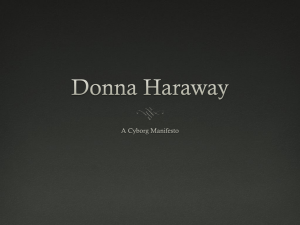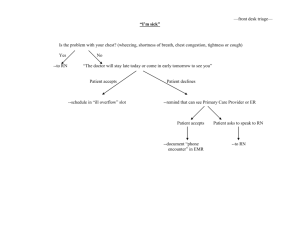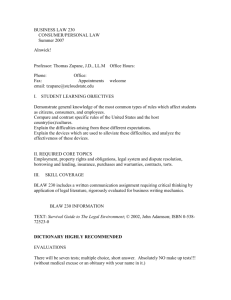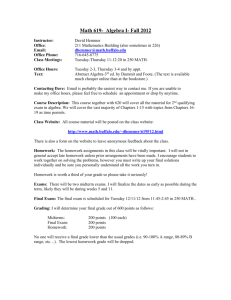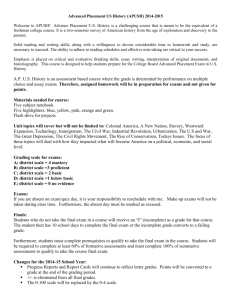HCCSS GOVERNMENT 2302 SYLLABUS
advertisement
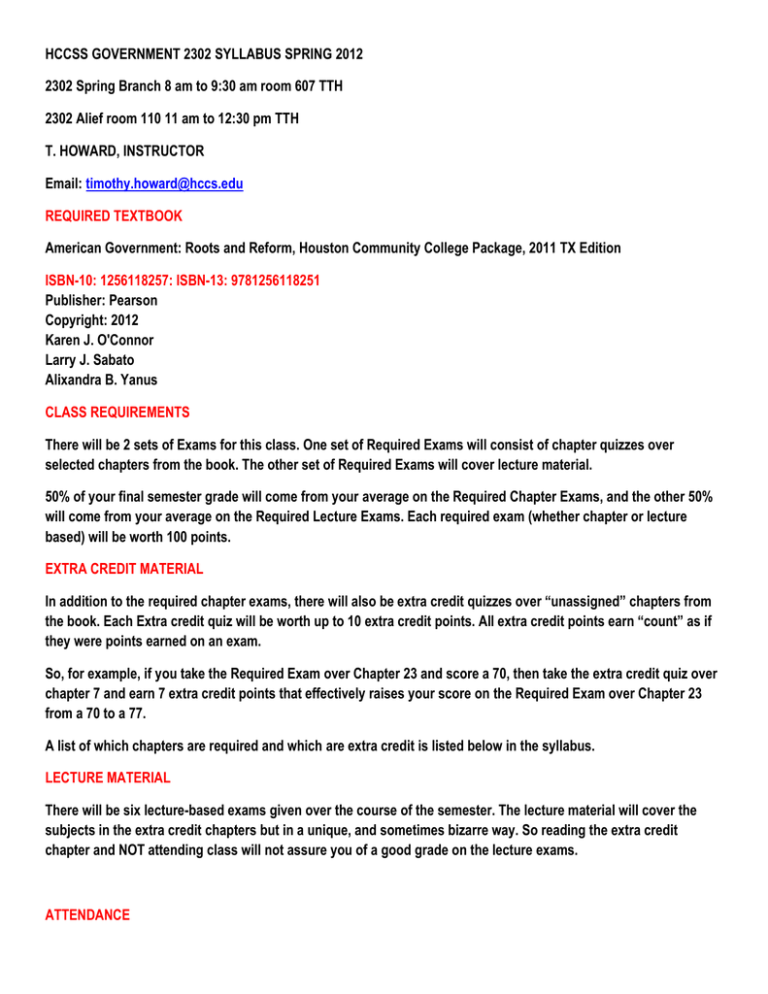
HCCSS GOVERNMENT 2302 SYLLABUS SPRING 2012 2302 Spring Branch 8 am to 9:30 am room 607 TTH 2302 Alief room 110 11 am to 12:30 pm TTH T. HOWARD, INSTRUCTOR Email: timothy.howard@hccs.edu REQUIRED TEXTBOOK American Government: Roots and Reform, Houston Community College Package, 2011 TX Edition ISBN-10: 1256118257: ISBN-13: 9781256118251 Publisher: Pearson Copyright: 2012 Karen J. O'Connor Larry J. Sabato Alixandra B. Yanus CLASS REQUIREMENTS There will be 2 sets of Exams for this class. One set of Required Exams will consist of chapter quizzes over selected chapters from the book. The other set of Required Exams will cover lecture material. 50% of your final semester grade will come from your average on the Required Chapter Exams, and the other 50% will come from your average on the Required Lecture Exams. Each required exam (whether chapter or lecture based) will be worth 100 points. EXTRA CREDIT MATERIAL In addition to the required chapter exams, there will also be extra credit quizzes over “unassigned” chapters from the book. Each Extra credit quiz will be worth up to 10 extra credit points. All extra credit points earn “count” as if they were points earned on an exam. So, for example, if you take the Required Exam over Chapter 23 and score a 70, then take the extra credit quiz over chapter 7 and earn 7 extra credit points that effectively raises your score on the Required Exam over Chapter 23 from a 70 to a 77. A list of which chapters are required and which are extra credit is listed below in the syllabus. LECTURE MATERIAL There will be six lecture-based exams given over the course of the semester. The lecture material will cover the subjects in the extra credit chapters but in a unique, and sometimes bizarre way. So reading the extra credit chapter and NOT attending class will not assure you of a good grade on the lecture exams. ATTENDANCE Attendance will be taken every day (if possible) the class meets and students will be awarded 1 extra credit points for every day they are in class on time, remain for the entire class period, stay awake, are not disruptive, etc. Extra credit points earned on attendance will count towards the lecture exam average. So, for example, if you earn 20 extra credit points for attendance, those 20 points will be added to the SUM of the points earned on your Required Lecture Exams. In theory, attendance can boost your Required Lecture Exam average by as much as 5 points. REQUIRED CHAPTERS EXTRA CREDIT CHAPTERS Subjects not covered in Class Subjects Covered in Class Lectures (Exams worth up to 100 pts each) (Exams worth up to 10 pts each) CHAPTER/SUBJECT CHAPTER/SUBJECT 23 TEXAS LEGISLATURE 5 CIVIL LIBERTIES 9 US EXECUTIVE BRANCH 6 CIVIL RIGHTS 11 GOVERNOR & BUREAUCRACY IN TX 7 CONGRESS 14 TEXAS JUDICIARY 8 PRESIDENCY 20 CONTEMPORARY POLICY ISSUES IN TX 10 FEDERAL JUDICIARY 18 ECONOMIC POLICY 19 FOREIGN & DEFENSE POLICY EAGLE ONLINE All class materials will be made available on the new Eagle Online system, including the Class Syllabus, Lecture Notes, and the link to the Exams. All Exams will be taken online either in the computer lab or at home. Generally, required exams will be taken in the computer lab and extra credit quizzes will be taken, or can be taken from home. Students should login to their Eagle Online account every day that class meets in order to keep up on class activities. IF A CLASS HAS TO BE CANCELLED, that information will be posted online and e-mailed to all enrolled students DEADLINES All class deadlines for any required or extra credit work will be announced IN CLASS. GRADE SCALE Grades will be based on a classic 10 point scale. You must have an average of 90 or better for an A, 80-89 for a B, 70-79 for a C, 60-69 for a D, An average of less than 60 will result in a grade of F or FX ADMINISTRATIVE RULES FOR THE COURSE A NOTE ON PROFESSIONALISM: By contracting to take this class you have entered into a business arrangement in which we are providing you with a service. That service is to further your education – not merely to give you college credit. All students should approach this class just as they would a business relationship. Respect should be given to all parties in the relationship (including your fellow students). The following also apply to this relationship: SCHOLASTIC DISHONESTY: If you are caught cheating in any way, on a quiz, test or on a paper, you will receive an 'F' for the course. I will follow school policy; I do not negotiate "second chances", period. Please -- if you are having trouble of any kind, discuss it with me. The tiny advantage you would get from cheating is vastly outweighed by the risk you would be taking. I am willing to help in any way I can, but I will NOT excuse cheating, no matter how much I like you. PLAGIARISM: Plagiarism (cheating) will result in an F for the course. For the purposes of this course: "Plagiarism means the appropriation of another's work and the unacknowledged incorporation of that work in one's own written work for credit. Collusion means the unauthorized collaboration with another person in preparing written work offered for credit." In other words, cheating is: (1) taking unchanged passages (or slightly edited) from another person's writing and portraying them as one's own; (2) submitting a paper that includes paraphrases of another person's writing without giving credit; (3) having someone else write your paper for you; and (4) copying another person's work during in-class writing or testing.” Basically, if you didn’t write it, you had better tell me where you got it from. If you are still unclear as to what constitutes plagiarism, please consult me. Plagiarism is almost as much work as doing the paper yourself and you will be caught. Also, be aware that my writing assignments are quite specific in nature and it is unlikely that you will find anything useful to plagiarize (although some of have tried – all have failed). STUDENT DISCIPLINE: Adult behavior is expected. Disruptive behavior/activities, which interfere with teaching and/or learning will not be tolerated, and may result in an administrative withdrawal without refund. DROP POLICY: I will NOT drop you from this course. If you are still on the roster and do not take the Final or submit all of the papers and tests, I will average your grade accordingly. Please fill out the withdrawal form in an HCC campus office if you wish to drop. The last day that you can drop the class is April 21. DUE TO A NEW HCCS POLICY ===> I WILL NOT BE ABLE TO DROP YOU UNDER ANY CIRCUMSTANCES AFTER THIS DATE. DISABILITIES: Any student with a documented disability (e.g., physical, learning, psychiatric, vision, hearing, etc.) who needs to arrange reasonable accommodations must contact the Disability Service Office (713-7185708) at the beginning of each semester. Faculty are authorized to provide only the accommodations requested by the Disability Support Services Office. NOTICE: Students who take a course for the third time or more must now pay significant tuition/fee increases at HCC and other Texas public colleges and universities. At HCC it is an additional $50 per credit hour. Beginning in Fall 2007, the Texas Legislature passed a law limiting first time entering freshmen to no more than SIX total course withdrawals throughout their educational career in obtaining a certificate and/or degree. THEREFORE: I will NOT drop you from this course. If you are considering course withdrawal because you are not earning passing grades, confer with me or a counselor as early as possible about your study habits; reading, writing, homework, and test-taking skills; course participation; and possible remedies such as tutoring or other assistance that might be available. HOUSTON COMMUNITY COLLEGE CORE CURRICULUM: Social Sciences comprise at least 15 semester hours of each student’s core curriculum. Essential to the learning process in the social sciences disciplines are at least six basic intellectual competencies. These include: --READING at the college level, meaning having the ability to analyze and interpret a variety of printed materials— books, articles, and documents. --WRITING at the college level, meaning having the ability to produce clear, correct, and coherent prose, adapted to purpose, occasion, and audience. This includes not only grammar, spelling, and punctuation, but the writing process itself. --SPEAKING effectively, meaning oral communication in clear, coherent, and persuasive language appropriate to purpose, occasion, and audience. --LISTENING at the college level, meaning the ability to analyze and interpret various forms of spoken communication. --CRITICAL THINKING, embracing methods for applying both qualitative and quantitative skills analytically and creatively to the subject matter in order to evaluate arguments, solve problems, and construct alternative strategies. --COMPUTER LITERACY, meaning having the ability to use computer-based technology in communicating, solving problems, and acquiring information. Students should also be able to evaluate the limits, problems, and possibilities associated with the use of present and future technologies. The following are HCCS’s stated exemplary educational objectives for its social sciences core. --To employ the appropriate methods, technologies, and data that social and behavioral scientists use to investigate the human condition. --To examine social institutions and processes across a range of historical periods, social structures, and cultures. --To use and critique alternative explanatory systems or theories. --To develop and communicate alternative explanations or solutions for contemporary social issues. --To analyze the effects of historical, social, political, economic, cultural, and global forces on the subject of study. --To comprehend the origins and evolution of the U.S. and Texas political systems, with a focus on the growth of political institutions, the constitutions of the U.S. and Texas, federalism, civil liberties, and human rights. --To understand the evolution and current role of the U.S. in the world. --To differentiate and analyze historical evidence (documentary and statistical) and differing points of view. --To recognize and apply reasonable criteria for the acceptability of historical evidence and social research. --To analyze, critically assess, and develop creative solutions to public policy problems. --To recognize and assume one’s responsibility as a citizen in a democratic society by learning to think for oneself, by engaging in public discourse, and by obtaining information through the news media and other appropriate information sources about politics and public policy. --To identify and understand differences and commonalties with diverse cultures. COURSE DESCRIPTION: Government 2302 is one of two courses designed to introduce students to the politics of national, state, and local government. GOVT 2301 and GOVT 2302 are fully transferable to other colleges and universities, and together meet the legislative requirement for government. Both GOVT 2301 and 2302 are sophomore-level classes that have a heavy writing and analysis component. It is strongly suggested that students taking these classes complete an English Composition class before attempting them. THE GOAL OF THIS COURSE: To make you a critical consumer of government and public information. To achieve this goal you have to achieve two sub-goals: 1) You must master the basic information about the way our government works – particularly as it relates to the question of how democracy (politics) and the creation of policy often come into conflict (Politics vs. Policy). 2) You must master the art and science of critical thinking. Almost all of your grade in this class will be determined by how well you reason and can present an argument, both written and oral. Your role in achieving these goals: 1) You must be prepared to learn. I cannot make you learn. I can only facilitate your learning by structuring assignments, lectures, and activities to achieve the goals of the course. 2) You must do the work. 3) You must come to class prepared to participate. My role in achieving these goals: 1) My primary responsibility is to facilitate your learning – not to spoon-feed you information. To that end: a. I provide structure and organization in the material through lecture and planned in-class activities. b. I provide timely assignments such as papers and exams that will help me monitor your progress in achieving the goals of the class. c. I provide individualized assistance and feedback to your efforts to master the material through grading, in-class feedback, and meetings outside of class as necessary. If you do not feel that I am living up to these responsibilities in your case or if you feel I have additional responsibilities not listed here, it is your responsibility to let me know so that I can do whatever is necessary to make corrections or discuss issues with you. ACADEMIC CALENDAR January 16 Monday Offices Closed- Martin Luther King, Jr. Observance January 17 Tuesday Classes Begin- Drop/Add/Swap Fee ($15.00) Begins January 17- February 2 70% Refund January 18 Wednesday Registration Ends January 18 Wednesday Last Day for Drop/Add/Swap January 30 Monday Official Date of Record February 3- 8 25% Refund February 15 Wednesday Priority Deadline for Spring Completion of Degrees or Certificates February 20 Monday Office Closed- Presidents Day Holiday March 12-18 Mon-Sun Office Closed- Spring Break March 29 Thursday Last Day for Administrative/ Student Withdrawals- 4:30pm April 6-8 Fri- Sun Office Closed- Spring Holiday April 13 Friday Veteran's Advanced-Pay Application Deadline for Summer Session April 16 Monday Deadline for Spring Federal Student Loans May 6 Sunday Instruction Ends May 7-13 Mon- SunFinal Examinations May 12 SaturdayGraduation Exercises May 13 Sunday Semester Ends May 14 Monday Grades Due by- 12:00 Noon May 18 Friday Grades Available to Students
